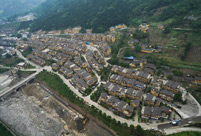BEIJING, May 16 -- The standoff between China and Vietnam in the South China Sea since May 2 has once again gripped global attention.
The United States wasted no time before rushing to blame China for so-called "provocative" actions.
The narrative all sounds too familiar: a rising China has become increasingly assertive in maritime disputes and constantly bullied its smaller neighbors.
But this narrative is, as it has always been, fundamentally flawed.
The area in focus is in the continuous zone of China's Xisha Islands, over which Beijing, with sound historical and legal proof, has long claimed sovereignty.
China has been preparing for drilling in the area for the last decade. The location is just 17 nautical miles from China's Zhongjian Island and some 130 to 150 nautical miles from Vietnam's coast.
Things turned sour only after Vietnamese ships and personnel repeatedly tried to disrupt the normal operations by a Chinese oil company.
In the following days, China has to beef up protection of the site.
Vietnam's stubbornness in harassing the Chinese oil rig runs huge risk, putting the safety of both the Chinese and Vietnamese personnel in jeopardy. It could also lead to unforeseeable and deadly consequences.
It is rather unwise for Vietnam to stoke up tensions in the South China Sea at this moment.
China values its ties with Vietnam. That's why Chinese Premier Li Keqiang, during his visit to Hanoi last October, worked relentlessly with Vietnamese leaders to comprehensively push forward bilateral cooperation over land, in the sea and in the financial sector.
But Vietnam has to understand China, while seeking win-win cooperation, will never sacrifice its sovereignty in the process.
At the same time, Vietnam's failure to rein in deadly mob attacks against foreign nationals and investment serves the country no good.
It tarnishes Vietnam's international image and undermines the government's credibility. Such chaos could easily spread and pose a real threat to Vietnam's own stability and national security.
China has never meant to create trouble in the South China Sea, but the country is not afraid of any trouble other countries might try to make in the region.
For Vietnam, after more than two weeks of counterproductive measures, it has to let cooler minds prevail and refrain from taking any moves that could further escalate the situation.
 A bite of Jiang Nan
A bite of Jiang Nan J-11 fighters training in complex meteorological conditions
J-11 fighters training in complex meteorological conditions PLA's tough exercises
PLA's tough exercises Best photos of the week
Best photos of the week  When we are young...
When we are young... Wedding photos of world champion
Wedding photos of world champion "The Most Beautiful Chinese Land"
"The Most Beautiful Chinese Land"  Men experience pains of childbirth on Mother's Day
Men experience pains of childbirth on Mother's Day  Six years after Wenchuan earthquake
Six years after Wenchuan earthquake  8 great movies to watch with your mom
8 great movies to watch with your mom China's most luminous celebrities
China's most luminous celebrities Newly recruited police in Hetian hold drill
Newly recruited police in Hetian hold drill  Bird-men compete flying in Hong Kong
Bird-men compete flying in Hong Kong  The 'Chinese Dad'
The 'Chinese Dad' Shanghai locals bid farewell to childhood memories
Shanghai locals bid farewell to childhood memoriesDay|Week|Month